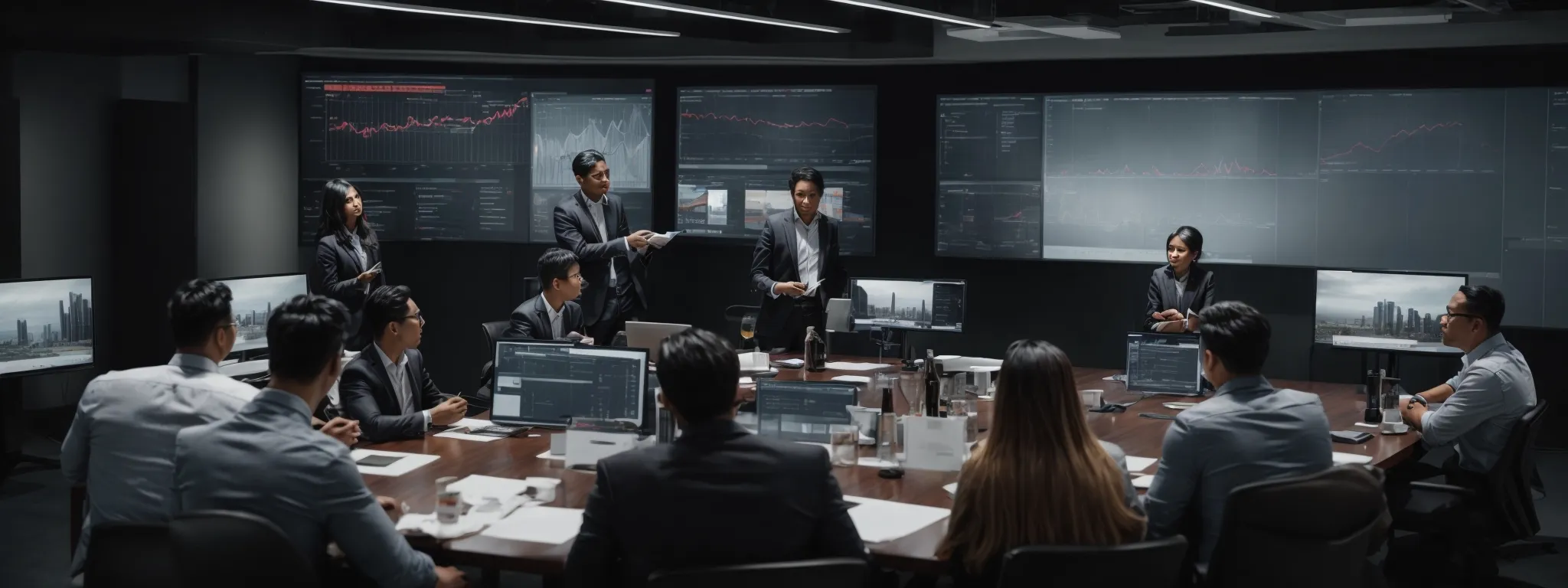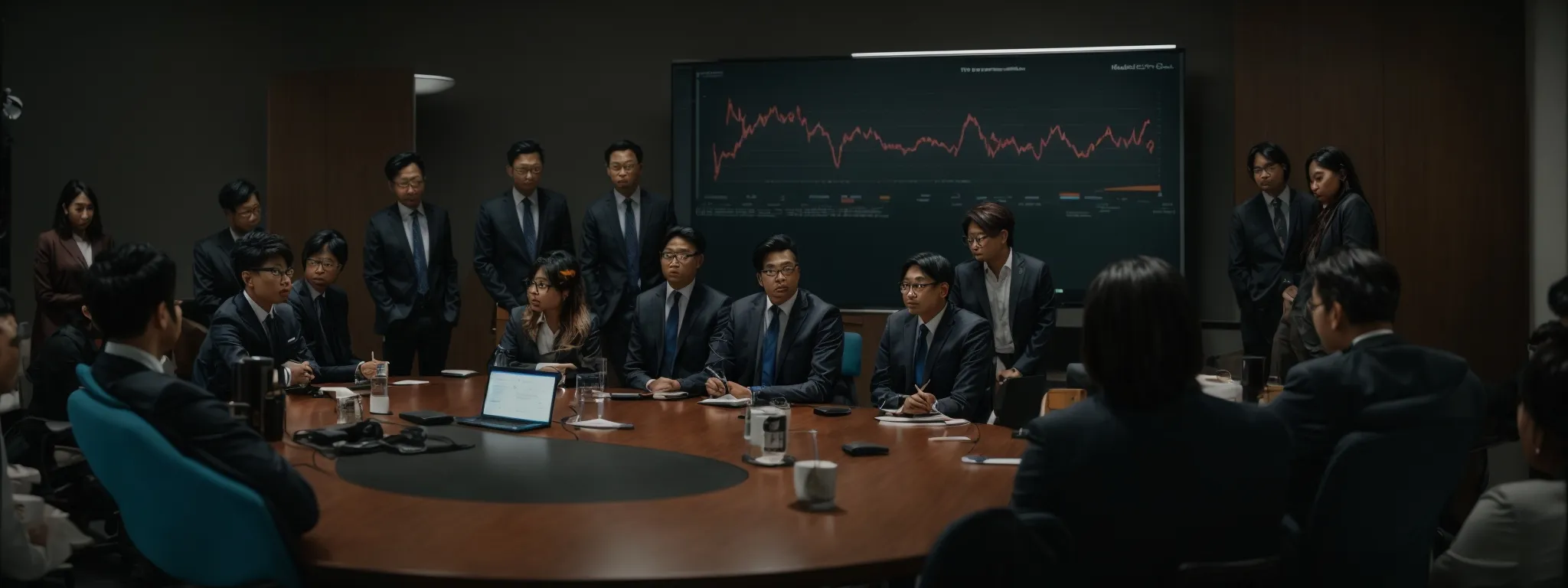Cross-Departmental Collaboration for SEO Success
Enhancing SEO Performance Through Cross-Departmental Collaboration In today’s competitive digital landscape, effective Search Engine Optimization (SEO) is not just a task for the marketing team; it requires […]
Enhancing SEO Performance Through Cross-Departmental Collaboration
In today’s competitive digital landscape, effective Search Engine Optimization (SEO) is not just a task for the marketing team; it requires the synchronized efforts of various departments within an organization.
As the delineation between SEO practices and other business activities becomes increasingly blurred, a cohesive cross-departmental approach emerges as crucial for enhancing a company’s online visibility and authority.
From developers refining site structure to content creators aligning brand messages, every role has a pivotal influence on the SEO landscape.
LinkGraph’s SEO services exemplify this integrated strategy, elevating enterprises in the search engine results page (SERP) through comprehensive collaboration.
Keep reading to uncover how breaking down departmental barriers can lead to a marked improvement in your SEO performance.
Key Takeaways
- Cross-Departmental Collaboration Enhances SEO Efforts and Aligns With Business Goals
- Regular Communication and Education Within Departments Ensure SEO Awareness and Integration
- Strategic Alignment of Content With SEO Goals Boosts Organic Visibility and Audience Engagement
- Analytics-Driven Decision Making and Monitoring of KPIs Optimize SEO Campaign Performance
- Celebrating SEO Successes Fosters Ongoing Collaborative Motivation and Innovation
Understanding the Role of Various Departments in SEO

In today’s digital landscape, an effective SEO strategy is rarely the product of a single department’s efforts.
Understanding how each sector within an organization contributes to SEO is pivotal for maximizing overall performance.
As such, the disciplines of web development, marketing, content production, and public relations must each recognize the necessity of incorporating SEO best practices into their distinct activities.
This cohesion prompts an environment where SEO awareness permeates the cross-functional landscape, harmonizing departmental goals with overarching SEO objectives and fostering an enterprise environment conducive to organic growth and enhanced search engine visibility.
Identifying Departmental Contributions to SEO
At the heart of a robust SEO strategy lies the insight that every department, from product teams to public relations, plays an integral role in enhancing a company’s search engine presence. Each group possesses unique skills and perspectives essential for molding a cohesive SEO framework that aligns with business objectives.
For instance, web developers ensure the technical SEO elements, such as site structure and mobile responsiveness, are robust and up-to-date, while content marketers concentrate on crafting materials that resonate with the target audience and embody the brand message:
- Web developers optimize codes and plugins that contribute to site speed and usability, directly affecting SEO performance.
- Marketing teams perform comprehensive keyword research to inform content production, encompassing both relevance to the audience and search engines.
- SEO specialists scrutinize data to refine SEO strategies, ensuring they align seamlessly with the larger marketing strategy and company goals.
- Public relations professionals cultivate a brand’s reputation management, thereby influencing how backlinks and user perceptions can impact organic search results.
Encouraging SEO Awareness Across Departments
Encouraging a culture of SEO awareness across various departments demands regular communication and education. Leaders from each sector, such as the marketing team, SEO managers, and web developers, must engage in consistent dialogue, sharing insights and integrating SEO considerations into their day-to-day operations and decision-making processes.
Organizing workshops and meetings offers an excellent platform for teams to discuss SEO challenges and triumphs, enabling the enterprise to adapt and refine its approach in real-time. This effort not only aligns with the enterprise’s overarching SEO and business goals but also ensures that employees across the board are invested in the company’s digital marketing success.
Mapping Departmental Goals to SEO Objectives
Aligning the ambitions of individual departments with the Comprehensive SEO Strategy of a company is essential for cumulative growth. Establishing clear objectives related to search engine performance, each department can then direct its efforts towards meeting these targets:
- Product teams can focus on optimizing product category pages for better visibility and user experience, which benefits SEO directly.
- The content marketing process is refined to ensure content aligns with keyword strategy, improving relevance and engagement in the search results.
- Public relations teams work to enhance brand authority by securing high-quality backlinks, thereby supporting SEO projects and overall web presence.
With SEO objectives as a shared focal point, departments are encouraged to innovate SEO solutions tailored to their expertise, thereby contributing to an adaptable and scalable enterprise SEO strategy. This Collaborative Approach ensures that SEO is not just an isolated task but a core component of every department’s agenda.
Breaking Down Silos for Unified SEO Strategy

In an age where digital sophistication dictates a brand’s success, a unified SEO strategy stands as a cornerstone of enterprise growth.
Yet, within many organizations, departmental silos create invisible barriers that hinder the seamless flow of SEO knowledge and strategies.
As businesses strive to enhance their SEO performance, recognizing the detriment of these silos, encouraging open lines of communication, and harnessing the diverse expertise across departments emerge as pivotal steps.
Engendering a collaborative culture shifts the focus from isolated efforts to a concerted force, optimizing the comprehensive SEO endeavors and laying a strong foundation for lasting success.
Recognizing the Pitfalls of Departmental Silos
The existence of departmental silos within an organization can be a significant impediment to SEO success. These silos represent a fragmentation of knowledge and resources that can prevent the seamless integration of SEO practices across an enterprise company. As a result, key opportunities for synergy and alignment with broader SEO and marketing objectives may be missed, impeding the effectiveness of the business’ digital presence.
LinkGraph recognizes that when departments operate in isolation, the continuity of user experience, messaging, and technical optimization can suffer, leading to inconsistent signals to search engines. Consequently, an enterprise’s efforts to achieve prominent SERP rankings can go unrewarded due to misaligned activities, diluted brand messages, and disjointed campaigns. Cross-departmental collaboration stands as a crucial element in overcoming these pitfalls and driving comprehensive improvements in search engine optimization.
Facilitating Interdepartmental Communication
To bridge the communication gaps that often hamper SEO effectiveness, it is imperative for LinkGraph to champion initiatives that promote ongoing dialogue between departments. Regular strategy sessions and real-time reporting channels can be instrumental in creating a feedback loop that propels SEO initiatives forward.
These initiatives are not without challenges; yet, the commitment to a shared platform where knowledge, successes, and obstacles are transparently shared ensures that LinkGraph delivers a cohesive SEO service to its clients:
- Integrated project management tools facilitate real-time updates and task coordination among marketing teams, SEO specialists, and web developers.
- Cross-departmental meetings are convened to address emerging SEO trends or algorithm updates, ensuring a unified response.
- SEO team leaders actively distribute learnings from recent campaigns, enabling all departments to apply successful tactics in future endeavors.
Centralizing these collaborative efforts under an all-encompassing SEO campaign management structure allows LinkGraph to maintain a unified approach that resonates across all levels of the enterprise brand, reinforcing the commitment to delivering consistent and Strategic SEO Outcomes.
Leveraging Diverse Skills for SEO Success
Leveraging a team’s diverse expertise is central to SEO success. By drawing on the strengths across departments—whether that involves the analytical prowess of the data team or the creative insights of the content marketers—LinkGraph ensures that every aspect of a client’s online presence is optimized for search engines and user engagement.
Each skill set contributes to a unique facet of SEO, from the granular details of keyword research to the broad strokes of global brand representation. Such collaboration empowers SEO teams to drive innovative strategies that are not only technical in execution but also resonant with a diverse user base:
- Technical SEO knowledge aids web developers in creating seamless user experiences on enterprise websites.
- Content creators harness keyword data to generate compelling blog posts that align with the brand’s content marketing strategy.
- Public relations experts manage a brand’s reputation by optimizing the quality and quantity of backlinks to the site.
Role of Development Teams in Enhancing SEO

In the orchestration of search engine optimization, the symbiotic relationship between development teams and SEO experts is a catalyst for impactful SEO performance.
Developers are the architects behind the digital infrastructure that not only supports but enhances SEO initiatives.
The mastery of technical SEO by these teams is crucial, as they work to construct enterprise websites with clean, efficient code and scalable features that accommodate the intricate demands of search algorithms.
Prioritizing SEO during the development process ensures that SEO teams are equipped with the tools necessary to compete in the digital arena, fostering a productive collaboration that embeds SEO best practices throughout the technological framework of a website.
Understanding the Technical Impact on SEO
The impact of web development on SEO cannot be overstated: these developers lay the groundwork for a site’s search engine performance. By implementing Technical SEO Considerations such as crawlability, indexation, and site speed, they pave the way for webpages to be properly understood and valued by search engines.
A website’s architecture directly influences its ability to rank well in search results. Developers ensure that a site is not only navigable by users but also accessible to search engine bots, optimizing for elements like structured data and meta tags for enhanced SERP performance.
| SEO Aspect | Development Focus | SEO Outcome |
|---|---|---|
| Site Speed | Minimize Code, Optimize Images | Faster Loading Times, Better Rankings |
| Crawlability | Clean, Structured URLs | Efficient Indexing by Search Engines |
| Mobile Responsiveness | Responsive Design | Improved User Experience on All Devices |
| Security | SSL Certificates | Secured User Data, Trust from Search Engines |
Streamlining Collaboration Between Developers and SEO Teams
Streamlining the collaboration between developers and SEO teams is essential for ensuring that SEO considerations are deeply integrated within the technical fabric of a website. When developers and SEO professionals work in tandem, they create a synergy that advances the SEO maturity of an enterprise website, ultimately fueling its online visibility and user engagement.
This close-knit partnership leads to a holistic SEO approach that includes technical compliance, strategic content placement, and the utilization of SEO tools for continuous improvement. The collaboration is encapsulated by:
- Shared objectives that align developers’ technical acumen with the SEO team’s insights into search engine algorithms.
- Regular cross-functional meetings enabling both teams to synchronize development and SEO campaigns effectively.
- Unified platforms where SEO tools, insights, and analytics can be leveraged for informed decision-making and enhancements.
The streamlined communication protocols and project management frameworks facilitate a proactive atmosphere wherein both teams are not just responding to SEO demands, but anticipating and shaping them. Through a unified strategy, developers and SEO experts at LinkGraph forge a dynamic enterprise SEO solution that is agile, responsive, and grounded in SEO best practices.
Prioritizing SEO in the Development Pipeline
The commitment to infusing SEO considerations into the development pipeline goes beyond mere protocol; it’s a strategic imperative that can profoundly influence the visibility and success of an enterprise website. By embedding SEO principles early into the development cycle, LinkGraph ensures every layer of the website contributes towards a robust online presence, effectively nullifying potential issues before they escalate.
LinkGraph champions a development ethos where SEO is not an afterthought but a guiding star, manifesting in features such as user-friendly navigation and search-friendly URL structures. This foresight in the development pipeline reinforces the importance of a seamlessly optimized website, where the harmony of technical specifications and SEO needs is orchestrated to achieve peak search engine performance.
Incorporating Content Teams Into SEO Optimization

As organizations strive to augment their digital footprint, the role of content teams in SEO optimization emerges as a fundamental cog in the machine of cross-departmental collaboration.
By meticulously intertwining content strategies with SEO ambitions, content teams ignite a powerful engine that drives search engine visibility and audience engagement.
Crafting SEO-focused content plans and quantifying the tangible impact these materials have on SEO performance are critical tasks that foster the growth and authority of a brand’s digital presence.
In this pursuit of excellence, content teams at LinkGraph diligently work to ensure that every article, blog post, and product description contributes to a cohesive narrative that elevates both the user experience and the enterprise’s competitive edge in search rankings.
Aligning Content Strategy With SEO Goals
Strategic alignment of content with SEO goals is a formidable approach LinkGraph employs to enhance the organic visibility of a client’s brand. By ensuring that each story, guide, and informational piece is crafted with precision, the content team at LinkGraph effectively captivates the target audience while adhering to the nuances of search algorithms.
The synergy between the creation of engaging content and meticulous SEO practices is evident in the increased search rankings and user engagement observed: advice, exploration, and presentation are key. Creating a coherent content strategy that resonates with the audience yet remains focused on SEO objectives involves:
- Merging keyword strategy with narrative development to provide value that goes beyond mere keyword inclusion.
- Adjusting the content marketing process to accommodate both SEO advancements and audience preferences.
- Evaluating and refining the impact of content-driven SEO through trial, analysis, and optimization.
Creating SEO-driven Content Plans
LinkGraph meticulously crafts SEO-driven content plans that serve as the backbone for modern SEO initiatives. These plans orchestrate content creation with targeted keyword data to construct a winning formula that strikes a balance between audience interest and search engine criteria.
The execution of these content strategies follows a calculated blueprint, grounded in extensive research and strategic foresight:
- Comprehensive keyword research informs the thematic elements of the content calendar, ensuring relevance to both search trends and user intent.
- Collaboration with SEO teams guarantees content is optimized for maximum impact, harnessing the potential of organic reach to boost website traffic and engagement.
- Regular review and adjustments of the content plan ensure its flexibility and adaptability to align with the dynamic nature of search algorithms and audience behavior.
Through the formation of tailored content calendars, LinkGraph positions its clients to outperform competitors, increasing visibility and fostering a connection with the target audience. The proactive blend of SEO expertise and creative content marketing results in an enterprise SEO strategy that resonates across search engines and supports sustainable growth.
Measuring the Impact of Content on SEO Performance
Measuring the impact of content on SEO performance is a critical element of LinkGraph’s comprehensive strategy. It involves tracking various metrics such as keyword rankings, organic traffic, user engagement levels, and conversion rates: metrics that directly reveal the content’s effectiveness in fulfilling SEO goals.
| Content Initiative | Metrics for Measurement | Impact on SEO Performance |
|---|---|---|
| Keyword-optimized Blog Posts | Organic Traffic, Time on Page, Bounce Rate | Improved Rankings, Enhanced User Engagement |
| Informational Guides | Backlinks Acquired, Social Shares, SERP Position | Increased Authority, Wider Reach, Authority Positioning |
| Product Category Content | Conversion Rate, Click-Through Rate (CTR) | Higher Sales Potential, User Experience Optimization |
LinkGraph’s meticulous approach to content analysis leverages advanced SEO tools for monitoring and interpreting data effectively. This allows the firm to refine content strategies dynamically and increase overall ROI as it correlates content production efforts to tangible business outcomes.
Harnessing Data Analytics for SEO Insights

In the realm of digital marketing, the strategic amalgamation of SEO data with business intelligence creates a robust foundation for informed decision-making.
Companies that leverage analytics to inform SEO decisions position themselves to not only understand but also anticipate market trends and user behavior.
It is within this confluence of data-driven insights and proactive strategy refinement that businesses can architect SEO strategies that are both agile and align with overarching corporate objectives.
By sharing these insights across departments, organizations like LinkGraph ensure a harmonized approach to SEO that amplifies performance and fosters sustained business growth.
Combining SEO Data With Business Intelligence
LinkGraph deftly combines SEO data with sophisticated business intelligence to carve out actionable strategies that resonate with company objectives. Rather than casting a wide net, this approach employs precise analytical methods to identify key performance indicators that align with business goals, thus optimizing resource allocation and maximizing the impact of SEO efforts.
The use of SEO data steeped in intelligent analysis not only enhances the precision of marketing tactics but also forecasts the trajectory of a brand’s digital presence. With LinkGraph’s strategic implementation, enterprises witness the transformative integration of granular keyword data and consumer behavior analytics into a cohesive blueprint for SEO success:
| SEO Metric | Business Insight | Informed Action |
|---|---|---|
| Organic Traffic Growth | Market Demand and User Engagement | Refinement of Content and User Experience |
| Bounce Rate | Website Interface and Content Relevancy | User Interface Enhancements and Targeted Content Updates |
| Keyword Ranking Improvements | Effectiveness of SEO Campaigns | Strategic Adjustments in SEO Initiatives |
| Conversion Rates | User Path to Purchase and Decision-making | Optimization of Conversion Funnels and Calls-to-Action |
Using Analytics to Inform SEO Decisions
In the sphere of search engine optimization, Leveraging Analytics is fundamental for crafting informed SEO strategies. Accurate interpretations of data illuminate the path to refined keyword targeting, effective content distribution, and tactical refinement of user experience.
Positioned at the intersection of digital scrutiny and SEO proficiency, LinkGraph wields analytics to propel SEO decisions that are precise and goal-oriented. Insight gleaned from user interactions and search patterns drives adaptive measures, bolstering a brand’s SERP prominence and digital footprint:
| SEO Decision | Analytics Leveraged | SEO Improvement |
|---|---|---|
| Content Topic Selection | User Search Trends, Keyword Performance | Enhanced Relevance and Audience Engagement |
| On-page Optimization | Page Views, Time on Site | Increased Organic Traffic and Reduced Bounce Rates |
| Conversion Optimization | Conversion Paths, User Flow Analysis | Heightened Conversion Rates and User Retention |
Through meticulous data analysis, LinkGraph identifies opportunities to optimize SEO initiatives, whether adjusting the content marketing strategy or enhancing site functionality. This data-driven approach underscores the significance of analytics in formulating SEO maneuvers that are not only responsive but also predictive of future trends.
Sharing Data Insights to Refine SEO Strategies
LinkGraph excels in the practice of distributing data-driven insights that fine-tune SEO strategies across departments. This strategic dissemination ensures that from executives to SEO teams, each member contributes to a more intelligent, unified approach, ultimately streamlining campaigns to meet multifaceted business goals with precision.
The firm’s comprehensive process involves transforming raw data into actionable intelligence, consequently strengthening the collaboration among SEO, content, product, and marketing teams. Such synergetic efforts drive continuous refinement of SEO strategies, leading to a resilient digital presence that evolves in tandem with market dynamics and algorithmic shifts.
Boosting SEO Through Cross-Departmental Training

Within the competitive tapestry of digital marketing, reinforcing an organization’s SEO capabilities reaches beyond the confines of the SEO department, permeating every facet of business operations.
Empowering staff across departments with SEO know-how harnesses collective expertise and forges a multidisciplinary force capable of driving holistic advances in search rankings.
Cross-departmental SEO training programs, frequent workshops, and the cultivation of departmental SEO champions become instrumental steps in embedding search engine optimization into the corporate DNA, inviting innovation, ensuring consistency, and amplifying a brand’s reach in the digital domain.
Designing an Effective Cross-Departmental SEO Training Program
To lay the groundwork for holistic SEO mastery within an enterprise, LinkGraph designs cross-departmental training programs tailored to enhance the collective understanding of SEO principles. These educational initiatives focus on equipping teams from marketing to development with actionable SEO skills and knowledge, facilitating a shared language for strategy development and seamless execution.
Considering the multifaceted nature of SEO, these training modules cover a spectrum of topics, from keyword research to analytics, ensuring that employees irrespective of their department, can contribute meaningfully to the company’s SEO initiatives. This approach not only democratizes SEO expertise across the enterprise but also nurtures a proactive culture geared towards Continuous SEO Improvement and innovation.
Scheduling Regular SEO Workshops and Updates
LinkGraph champions the organization of SEO workshops and update sessions as a means to ensure that knowledge is not static but grows alongside the industry’s rapid evolution. These gatherings serve as crucibles for innovation, where teams across various departments come together to share insights and learn about the latest SEO techniques and changes in algorithms.
The regular cadence of these educational opportunities guarantees that every employee, regardless of their role, remains informed and adept at deploying up-to-date SEO practices that drive the company’s collective online strategy forward. This commitment to continuous learning reflects LinkGraph’s dedication to maintaining a workforce that’s not only skilled but also agile in the dynamic sphere of search engine optimization.
Encouraging Departmental SEO Champions
Fostering departmental SEO champions within an organization is a strategic move by LinkGraph, designed to create pillars of SEO advocacy and expertise in multiple areas of the business. These champions drive department-specific optimization efforts, translating broad SEO strategies into actionable tasks tailored to their respective fields.
LinkGraph underscores the value of such empowered individuals by providing them with the tools and knowledge necessary to educate their colleagues, ultimately creating a ripple effect that permeates departmental barriers and elevates the overall SEO acumen of the enterprise.
Measuring the Impact of Collaboration on SEO Performance

The vitality of collaboration in refining search engine optimization strategies is quantifiable, with the alignment of departments manifesting in measurable SEO enhancements.
Setting the right key performance indicators (KPIs) for cross-departmental SEO efforts lays the roadmap for success.
It is the careful monitoring of these KPIs that enables teams to track progress, make data-driven adjustments to their strategies, and quantify the impact of their cooperative endeavors.
Celebrating these SEO wins not only demonstrates the tangible benefits of collaboration but serves as a catalyst for sustaining a culture of shared triumphs and persistent innovation in SEO practices.
Setting KPIs for Cross-Departmental SEO Efforts
Establishing Key Performance Indicators (KPIs) is a strategic endeavor for LinkGraph, seeking to crystallize cross-departmental contributions to SEO advancement. These KPIs, consistent with enterprise SEO strategies and company objectives, enable the meticulous tracking and assessment of collaborative SEO projects, ensuring efforts by marketing teams, content creators, and web developers are aligned and efficient.
LinkGraph, as an experienced SEO company, recognizes the significance of defining clear, quantifiable KPIs that reflect the collective input of various departments. By doing so, the agency not only underscores the efficacy of harmonious SEO practices but also empowers teams to directly correlate their actions to specific improvements in search engine rankings and organic traffic growth.
Tracking Progress and Adjusting Strategies
To calibrate SEO initiatives effectively, LinkGraph deftly embraces an analytics-driven approach, consistently monitoring campaign metrics to gauge progress. This vigilant analysis allows the agency to identify performance deviations early and pivot strategies promptly, ensuring that SEO outcomes remain in alignment with predetermined objectives.
Strategic recalibration is essential as LinkGraph responds to the dynamic digital marketing landscape, refining SEO tactics where necessary to optimize search engine rankings and achieving desired increases in organic traffic. The firm astutely shifts resources, modulates content directives, and adjusts technical configurations in response to real-time analytics, cementing measurable improvements in SEO efficacy.
Celebrating SEO Wins to Motivate Continued Collaboration
Celebrating successful outcomes in SEO efforts acts as a powerful impetus for fostering an environment of sustained cross-departmental collaboration. LinkGraph recognizes that by highlighting and acknowledging joint triumphs in search engine optimization, companies can galvanize teams across various segments to maintain a unified front in the ongoing quest for digital prominence.
By publicly recognizing the contributions that individual departments make towards collective SEO milestones, LinkGraph instills a spirit of pride and shared purpose among employees. This commendation serves not only as recognition for work well done but also as an invigorating force that motivates departments to continue their collaborative pursuits, setting the stage for future victories in organic search achievements.
Conclusion
Cross-departmental collaboration is essential to enhance SEO performance, as it breaks down silos that often hinder the integration of SEO practices.
By fostering communication and harmony between departments like web development, content creation, marketing, and public relations, an organization can create a unified SEO strategy.
When departments work together, leveraging their unique skills and insights, they contribute to a more effective and holistic SEO framework.
This synergy not only optimizes a website’s technical elements but also produces content that resonates with both search engines and the target audience, ultimately leading to a stronger online presence and sustained organic growth.
Regular training programs and data sharing among departments further solidify this collaborative model, enabling continuous strategic refinement and the achievement of shared SEO objectives.
Celebrating shared successes in SEO initiatives reinforces the collaborative culture and the commitment to joint progress in achieving digital marketing goals.















































































